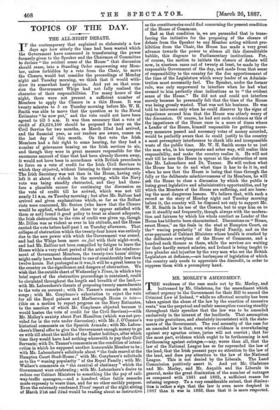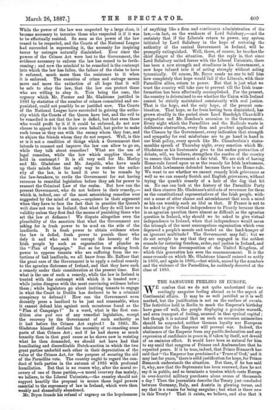MR. MORLEY'S AMENDMENT.
THE weakness of the case made out by Mr. Morley, and buttressed by Mr. Gladstone, for the amendment which refused urgency to the Government for their Bill to amend the Criminal Law of Ireland, " while no effectual security has been taken against the abuse of the law by the exaction of excessive rents," was the perpetual and unfair assumption running steadily throughout their speeches that the law was to be amended exclusively in the interest of the landlords. That assumption was quite gratuitous, and absolutely inconsistent with the state- ments of the Government. The real necessity of the case for an amended law is that, even where evidence is overwhelming against any agrarian crime,juries will not convict; that for the most part, evidence which ought to be forthcoming is not forthcoming against outrages,—nay, worse than all, that the law of the National League has so far superseded the law of the land, that the Irish peasant pays no attention to the law of the land, and does pay attention to the law of the National League. This is not denied by the Liberals. The Land Commission positively assert it. And yet Mr. Gladstone and Mr. Morley, and Mr. Asquith and the Liberals in general, make the great diminution of the number of outrages as compared with 1881 and 1882, a sufficient reason for refusing urgency. To a very considerable extent, that diminu- tion is rather a sign that the law is even more despised in 1887 than it was in 1882, than that it is more respected.
While the power of the law was respected by a large class, it became necessary to terrorise those who respected it if it was to be effectually resisted. So soon as the power of the law ceased to be respected, and the Courts of the National League had succeeded in superseding it, the necessity for inspiring terror by outrages naturally diminished. Ever since the powers of the Crimes Act were lost to the Government, the evidence necessary to enforce the law has ceased to be forth- coming ; and now the mischief to be remedied is the contempt into which the law has fallen, the failure of the claim to have it enforced, much more than the resistance to it when it is enforced. The cessation of crime and outrage means more and more the extinction of all hope that it will be safe to obey the law, that the law can protect those who are willing to obey it. This being the case, the urgency which Mr. Forster and Mr. Gladstone justified in 1881 by statistics of the number of crimes committed and un- punished, could not possibly be so justified now. The Courts of the National League have succeeded in gaining the autho- rity which the Courts of the Queen have lost, and the evil to be remedied is not that the law is defied, but that even those who would profit by it if it could be enforced, do not now choose to appeal to it on their own behalf, but prefer to make such terms as they can with the enemy whom they fear, and to abjure the friends whom they do not respect. Well, is this or is it not a condition of things which a Government that intends to reassert and improve the law can allow to go on, while they talk about remedies? What are the use of legal remedies, while the law which supplies them is held in contempt I It is all very well for Mr. Morley and Mr. Gladstone and Mr. Asquith, who have made up their minds that the only way to restore the autho- rity of the law, is to hand it over to be remade by the law-breakers, to revile the Government for not having recourse to remedial legislation before they ask for power to reassert the Criminal Law of the realm. But how can the present Government, who do not believe in their remedy,— which is, indeed, one of the most astonishing remedies ever suggested by the mind of rnan,—acquiesce in their argument when they have to face the fact that in practice the Queen's writ does not run in Ireland, that what they do will have no validity unless they first find the means of punishing those who set the law at defiance ? We dispute altogether even the plausibility of the assertion that what the Government are asking for is fresh power to be used on the side of the landlords. It is fresh power to obtain evidence when the law is defied, fresh power to punish those who defy it and who seek to corrupt the honesty of the Irish people by such an organisation of plunder as the "Plan of Campaign." But so far from seeking fresh power to oppress tenants who are suffering from the ex- tortions of bad landlords, we all know from Mr. Balfour that the great care of the Government is to apply a radical remedy to the agrarian distresses of Ireland, and that they have such a remedy under their consideration at the present time. But what is the use of such a remedy, while the law in Ireland is treated with the contempt with which it is treated now ; while juries disagree with the most convincing evidence before them ; while legislators go about inciting tenants to engage in what the Court in Dublin has declared to be a criminal conspiracy to defraud ? How can the Government even decently press a landlord to be just and reasonable, when it cannot defend him against such monstrous fraud as the "Plan of Campaign I" In a word, what is the first con- dition sine qua non of any remedial legislation, except the recovery by the Government of such authority as it had before the Grimes Act expired ? In 1885, Mr. Gladstone himself declared the necessity of re-enacting some parts of that Crimes Act ; and if he had shown as much tenacity then in that good cause as he shows now in resisting what he then demanded, we should not have had that humiliating and discreditable Dutch-auction in which the two great parties underbid each other in their depreciation of the value of the Crimes Act, for the purpose of securing the aid of the Parnellite vote. The country ought to regard the con- duct of both parties in the autumn of 1885 with profound humiliation. But that is no reason why, after the moral re- covery of one of those parties,—a moral recovery due mainly, we believe, to the Liberal Unionists,—the country should not support heartily the proposal to secure those legal powers essential to the supremacy of law in Ireland, which were then weakly and shamefully abandoned. Mr. Bryce founds his refusal of urgency on the hopelessness of anything like a firm and continuous administration of the law,—in fact, on the weakness of Lord Salisbury,—and the certainty that if the Liberals return to power, any system initiated by Lord Salisbury in the hope of restoring the authority of the central Government in Ireland, will be promptly extinguished. Well, there, of course, he touches the chief danger of the situation. But the reply is, that since Lord Salisbury united forces with the Liberal Unionists, there has been a new strength and steadiness in his Government, a new hope infused into it of acting strongly without acting tyrannically. Of course, Mr. Bryce needs no one to tell him how completely that hope would fail if the Liberals, with their Parnellite allies, return to power. But that is just what we trust the country will take care to prevent till the Irish trans- formation has been effectually accomplished. For the present, the country is determined to see whether the Union with Ireland cannot be strictly maintained consistently with real justice. That is the hope, and the only hope, of the present com- bination. That hope, so far from having been diminished, has grown steadily in the period since Lord Randolph Churchill's resignation and Mr. Gosehen's accession to the Government. Every night which the Parnellites and the Radicals waste in deliberate obstruction, every firm and prudent application of the Closure by the Government, every indication that strength and sympathy for real misfortune are to go hand in hand in our Irish policy, every speech like Mr. Chamberlain's states- manlike speech of Thursday night, every sanction which Mr. Gladstone or his lieutenants give to the undue protraction of debate, will, we believe, strengthen the resolve of the country to ensure this Government a fair trial. We are sick of having Home-rule forced upon us as the remedy for Irish lawlessness, and Irish lawlessness defended because there is no Home-rule. We want to see whether we cannot remedy Irish grievances as well as we can remedy Scotch and English grievances, without trying the quack's remedy of a hair of the dog that bit us. No one can look at the history of the Parnellite Party and then observe Mr. Gladstone's attitude of reverence for them as the constitutional representatives of the Irish people, with- out a sense of utter shame and astonishment that such a mind as his can worship such an idol as that. If France is not to be asked to give virtual independence to Picardy because there is an agrarian question there almost as difficult as the agrarian question in Ireland, why should we be asked to give virtual independence to Ireland, when that independence would mean the triumph of the most unscrupulous organisation which ever depraved a people's morals and traded on the land-hunger of an ignorant multitude I The Government may fail ; but we do not scruple to say that they are engaged in the noblest crusade for restoring freedom, order, and justice in Ireland, and for resisting the decomposition of the United Kingdom, of which this generation has seen the commencement. It is the. same crusade on which Mr. Gladstone himself entered so nobly in 1869, and again in 1880,—but which, scared by the numbers and the violence of the Pamellites, he suddenly deserted at the close of 1885.















































 Previous page
Previous page